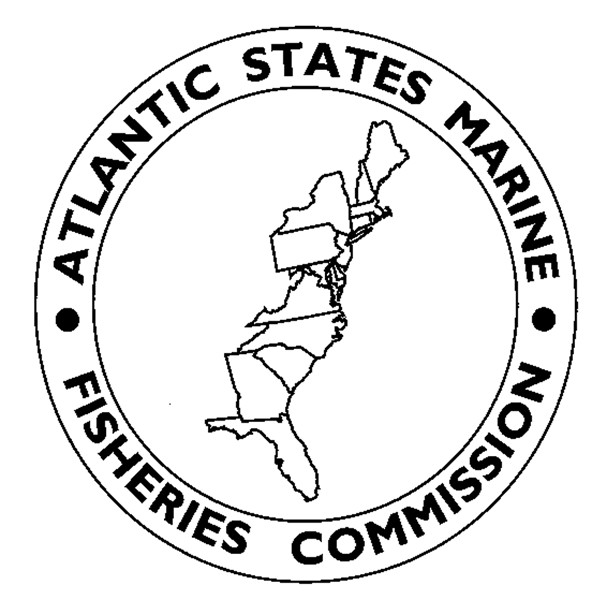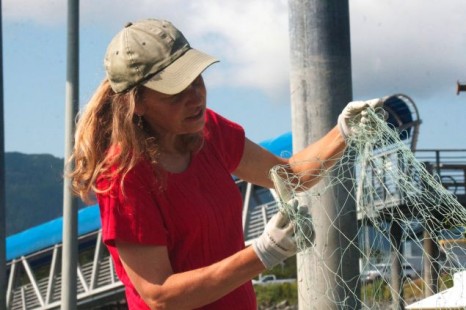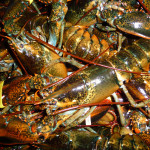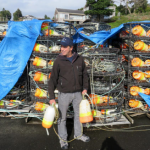Daily Archives: August 22, 2015
Fishing enthusiast says letterbox bombed over campaign to ban commercial netting
 Judy Lynne, executive officer of recreational fishing group Sunfish, has been locked in a battle against commercial netters. She said her mailbox exploded in flames on Thursday night, on the eve of the State Government announcing three net-free zones. Ms Lynne, who was celebrating the anti-netting victory, said the timing of the bombing was suspect. Ms. Lynne said other Sunfish members had been victims of anonymous death threats and harassment as the campaign heated up. Read the rest here 20:27
Judy Lynne, executive officer of recreational fishing group Sunfish, has been locked in a battle against commercial netters. She said her mailbox exploded in flames on Thursday night, on the eve of the State Government announcing three net-free zones. Ms Lynne, who was celebrating the anti-netting victory, said the timing of the bombing was suspect. Ms. Lynne said other Sunfish members had been victims of anonymous death threats and harassment as the campaign heated up. Read the rest here 20:27
Is the Atlantic States Marine Fisheries Commission going to Privatize the Maine Shrimp Fishery?
 Regulators are considering putting a limit on the number of fishermen who can participate in the Gulf of Maine’s beleaguered shrimp fishery in an attempt to revive the shuttered industry. A board of the Atlantic States Marine Fisheries Commission is developing a proposal to control the number of fishermen who can fish for the shrimp that are prized for their sweet, tender meat. The plan will likely be the subject of public hearings next year, and could apply as soon as the 2017 fishing year, said commission spokeswoman Tina Berger. Read the rest here 12:49
Regulators are considering putting a limit on the number of fishermen who can participate in the Gulf of Maine’s beleaguered shrimp fishery in an attempt to revive the shuttered industry. A board of the Atlantic States Marine Fisheries Commission is developing a proposal to control the number of fishermen who can fish for the shrimp that are prized for their sweet, tender meat. The plan will likely be the subject of public hearings next year, and could apply as soon as the 2017 fishing year, said commission spokeswoman Tina Berger. Read the rest here 12:49
Meet the women behind the nets – Net Mending Through the eye of a needle
 Joan Songer’s fingers tug at the twine, and she reels in a net as green and salty as the tide. This is where she loves it best: the harbor. Its warped boards under her feet, the voices of fishermen, the tang of the air. “Where else can you work with this beauty surrounding you?” She asks. No question, she loves it. From her corner in the old harbor, Lisa Brost looks like a featherweight boxing champ wielding a needle and thread. She bounces on the balls of her feet. Her tan arms end in white gloves that proclaim, in black ink, “tough.” Read the rest here 12:10
Joan Songer’s fingers tug at the twine, and she reels in a net as green and salty as the tide. This is where she loves it best: the harbor. Its warped boards under her feet, the voices of fishermen, the tang of the air. “Where else can you work with this beauty surrounding you?” She asks. No question, she loves it. From her corner in the old harbor, Lisa Brost looks like a featherweight boxing champ wielding a needle and thread. She bounces on the balls of her feet. Her tan arms end in white gloves that proclaim, in black ink, “tough.” Read the rest here 12:10
American Seafoods restructures debt, attracts new backers
 After reeling in new capital, the company that calls itself “the largest harvester of wild-caught fish for human consumption in the U.S.” has reduced its debts from a previously estimated $900 million-plus to $740 million. CEO Bernt Bodal said the deal gives American Seafoods stability and adds as investors some experienced industry people with whom he’s had a “very, very long-term connection.” Those include Chris Lischewski, CEO of Bumble Bee Foods in San Diego; Amy Humphreys, former CEO of Seattle-based Icicle Seafoods; and Frank Dulcich, CEO of Mukilteo-based Pacific Seafood Group. Read the rest here 11:03
After reeling in new capital, the company that calls itself “the largest harvester of wild-caught fish for human consumption in the U.S.” has reduced its debts from a previously estimated $900 million-plus to $740 million. CEO Bernt Bodal said the deal gives American Seafoods stability and adds as investors some experienced industry people with whom he’s had a “very, very long-term connection.” Those include Chris Lischewski, CEO of Bumble Bee Foods in San Diego; Amy Humphreys, former CEO of Seattle-based Icicle Seafoods; and Frank Dulcich, CEO of Mukilteo-based Pacific Seafood Group. Read the rest here 11:03
10 Years Forward: Fishermen ride out rough waters after Katrina, clear skies ahead
 Long before Hurricane Katrina roared through, south Louisiana’s commercial industry already faced major challenges. Katrina just became the next hurdle fishermen had to endure to stay afloat. In the decade since, St. Bernard and Plaquemines parishes have faced more storms, the BP oil spill, and the continued disappearance of valuable wetlands. Still, they’ve managed to survive and thrive. “I’m going to be dancing at 100! That’s my goal,” said Tommy Gonzales. All his life, he’s trapped and fished the waters of Delacroix Island and the Gulf of Mexico. For hundreds of years, commercial fishing has been a way of life in Shell Beach. Video, Read the rest here 10:43
Long before Hurricane Katrina roared through, south Louisiana’s commercial industry already faced major challenges. Katrina just became the next hurdle fishermen had to endure to stay afloat. In the decade since, St. Bernard and Plaquemines parishes have faced more storms, the BP oil spill, and the continued disappearance of valuable wetlands. Still, they’ve managed to survive and thrive. “I’m going to be dancing at 100! That’s my goal,” said Tommy Gonzales. All his life, he’s trapped and fished the waters of Delacroix Island and the Gulf of Mexico. For hundreds of years, commercial fishing has been a way of life in Shell Beach. Video, Read the rest here 10:43
Dallas chefs say small portions key to enjoying escolar, dubbed ‘the Ex-Lax fish’
The fish has gone by many names: oilfish, white tuna, super white tuna, butterfish and walu among them. But the very qualities celebrated by these names — the buttery consistency and rich taste — are also behind another, less attractive name: “the Ex-Lax fish.” Indigestible wax esters give the fish a flavor that some chefs praise but that, in larger portions, can provoke food-poisoning-like symptoms or diarrhea. You might assume a food that causes these types of reactions wouldn’t be sold in mainstream restaurants. But escolar, served by more than a dozen,,, Read the rest here 10:13
Lauren Reid: The Truth About Tuna – Sailing to the Front Line of Pacific Tuna Fisheries
 With recent stories of overfishing, shark finning, and human rights abuses (one New York Times reporter stated that being a fisherman in some parts of the Pacific Ocean “was a job where more than 50 percent of workers report their boss killing a co-worker”), I can’t help but feel extremely moved and heartbroken if these are true. The best way for me to comprehend how our canned tuna actually gets from sea to plate is to head to the source itself. Read Sailing to the Front Line of Pacific Tuna Fisheries – part one, Out on the High Seas – part two, Hard Life Aboard – part three, Reflections on Commercial Fishing – part four.09:35
With recent stories of overfishing, shark finning, and human rights abuses (one New York Times reporter stated that being a fisherman in some parts of the Pacific Ocean “was a job where more than 50 percent of workers report their boss killing a co-worker”), I can’t help but feel extremely moved and heartbroken if these are true. The best way for me to comprehend how our canned tuna actually gets from sea to plate is to head to the source itself. Read Sailing to the Front Line of Pacific Tuna Fisheries – part one, Out on the High Seas – part two, Hard Life Aboard – part three, Reflections on Commercial Fishing – part four.09:35
Nobody wants to answer the phone when a whale corpse needs to be removed
 Dead whale is the kind of stink you never forget. Dwayne MacDonald has smelled it, and he doesn’t want to inflict its lingering aromas on his fellow Cape Bretoners. “This is something that happens every year,” he said. “It’s not a major shock when a whale washes up in Inverness County.” He’s the councillor for the area, and has heard about three dead whales in the last week. “Every year, the same process starts where a resident calls around to different levels of government and says, ‘How do we handle this?’ And they pass the buck to the next person down the line.” Read the rest here 08:32
Dead whale is the kind of stink you never forget. Dwayne MacDonald has smelled it, and he doesn’t want to inflict its lingering aromas on his fellow Cape Bretoners. “This is something that happens every year,” he said. “It’s not a major shock when a whale washes up in Inverness County.” He’s the councillor for the area, and has heard about three dead whales in the last week. “Every year, the same process starts where a resident calls around to different levels of government and says, ‘How do we handle this?’ And they pass the buck to the next person down the line.” Read the rest here 08:32


















































